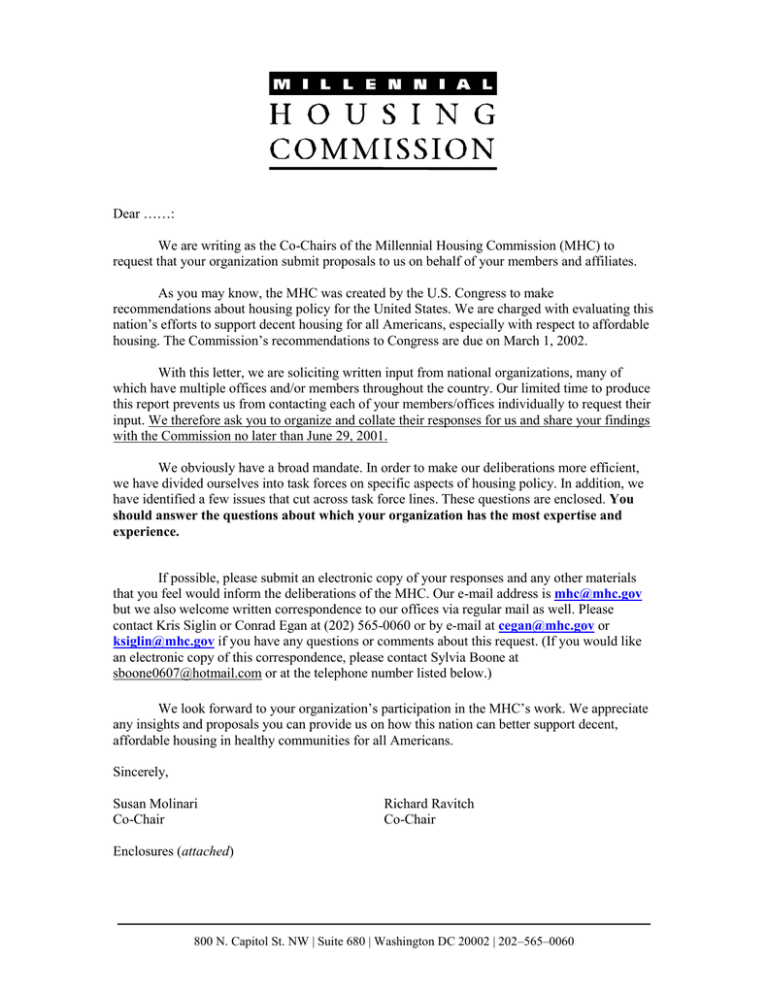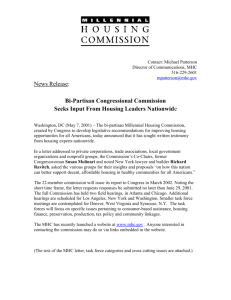Document 15585608
advertisement

Dear ……: We are writing as the Co-Chairs of the Millennial Housing Commission (MHC) to request that your organization submit proposals to us on behalf of your members and affiliates. As you may know, the MHC was created by the U.S. Congress to make recommendations about housing policy for the United States. We are charged with evaluating this nation’s efforts to support decent housing for all Americans, especially with respect to affordable housing. The Commission’s recommendations to Congress are due on March 1, 2002. With this letter, we are soliciting written input from national organizations, many of which have multiple offices and/or members throughout the country. Our limited time to produce this report prevents us from contacting each of your members/offices individually to request their input. We therefore ask you to organize and collate their responses for us and share your findings with the Commission no later than June 29, 2001. We obviously have a broad mandate. In order to make our deliberations more efficient, we have divided ourselves into task forces on specific aspects of housing policy. In addition, we have identified a few issues that cut across task force lines. These questions are enclosed. You should answer the questions about which your organization has the most expertise and experience. If possible, please submit an electronic copy of your responses and any other materials that you feel would inform the deliberations of the MHC. Our e-mail address is mhc@mhc.gov but we also welcome written correspondence to our offices via regular mail as well. Please contact Kris Siglin or Conrad Egan at (202) 565-0060 or by e-mail at cegan@mhc.gov or ksiglin@mhc.gov if you have any questions or comments about this request. (If you would like an electronic copy of this correspondence, please contact Sylvia Boone at sboone0607@hotmail.com or at the telephone number listed below.) We look forward to your organization’s participation in the MHC’s work. We appreciate any insights and proposals you can provide us on how this nation can better support decent, affordable housing in healthy communities for all Americans. Sincerely, Susan Molinari Co-Chair Richard Ravitch Co-Chair Enclosures (attached) 800 N. Capitol St. NW | Suite 680 | Washington DC 20002 | 202–565–0060 Millennial Housing Commission Task Forces Consumer-Based Assistance 1. 2. 3. 4. How well or badly are vouchers working in different markets? What factors lead to success with vouchers for tenants? How can vouchers best support mobility and self-sufficiency for the families that receive them? To what extent should vouchers be project based or otherwise linked to production programs? If so, how and how many? Should consumer based assistance also be made available to low income homeowners with severe housing cost burdens? If so, how should this be done? Housing Finance 1. 2. How can access to capital for homeownership (for refinancing as well as purchase) be improved for those who currently fall through the gaps? How can the multifamily housing finance delivery system be improved for housing production and preservation? Preservation 1. 2. How can we best provide the capital to finance the rehabilitation needs of the affordable housing stock (both public housing and the assisted inventory)? How can this existing stock be preserved so that the properties involved are self-supporting in the future? Production 1. 2. 3. How well do current programs operate as production tools (e.g., HOME, CDBG, HOPE VI, §202, §811)? How well do they work with each other? How can they be improved? What are the merits of the various proposals to create a new housing production program? What unmet needs are being addressed in each proposal? What innovative and creative programs are being used by states and local governments to produce affordable housing? Tax Policy 1. 2. How could the various tax policy “tools” (e.g., tax credits, bonds, passive loss allowances) be better used to promote (a) the production of affordable rental housing, including housing for extremely low-income families, and (b) homeownership? Regarding the preservation of affordable housing, what changes to tax policy would enable owners of assisted properties and older Low-Income Housing Tax Credit units to either maintain these properties as affordable housing or to sell them to owners who would rehabilitate them? 800 N. Capitol St. NW | Suite 680 | Washington DC 20002 | 202–565–0060 Community Linkages 1. 2. How can the eligibility requirement and planning requirements that govern housing programs be coordinated with non-housing programs (such as transportation, child care, and health care) so that housing policy reinforces welfare reform to assist strong, self-sufficient families? Are there best practices that should be used in affordable housing programs so that housing assistance has a positive impact on the broader community and helps create healthy neighborhoods? Are mixed-income, mixed-use developments preferable? Millennial Housing Commission Cross-Cutting Issues 1. How are the challenges of meeting very low-income and extremely lowincome households’ housing needs best met? To what extent should this challenge be met with debt subsidies, capital subsidies or tenant-based subsidies? 2. How should technology be best used to meet housing challenges? 3. How should quality control be best ensured in an era of devolution? How can accountability be assured without unnecessary bureaucracy? 4. How should housing policies best intersect with issues of place, including sprawl, “smart growth,” and neighborhood revitalization? 5. How should policies to increase housing availability and affordability best intersect with fair housing policies? 800 N. Capitol St. NW | Suite 680 | Washington DC 20002 | 202–565–0060

